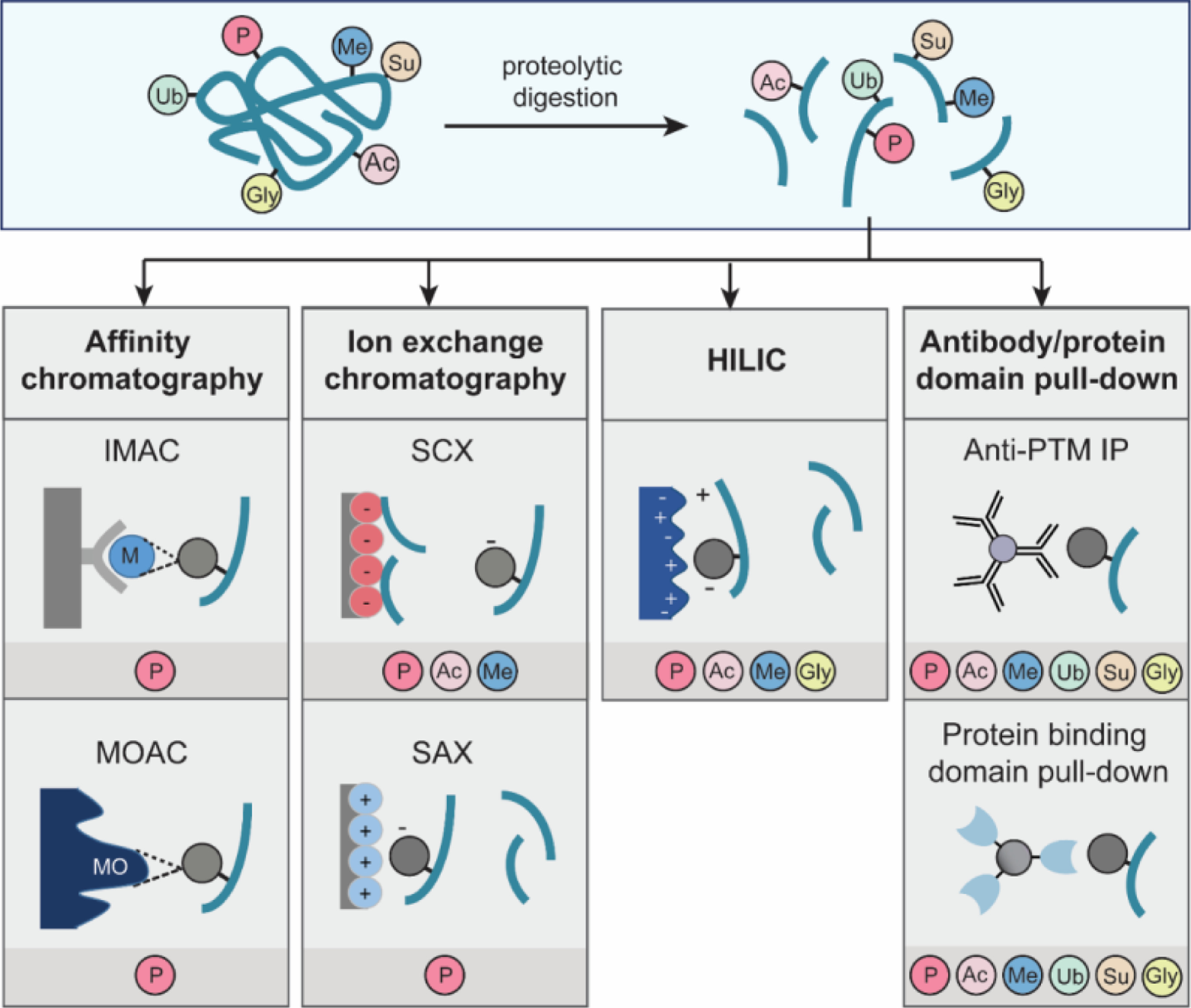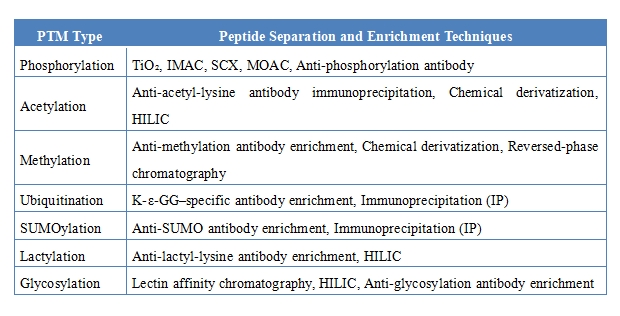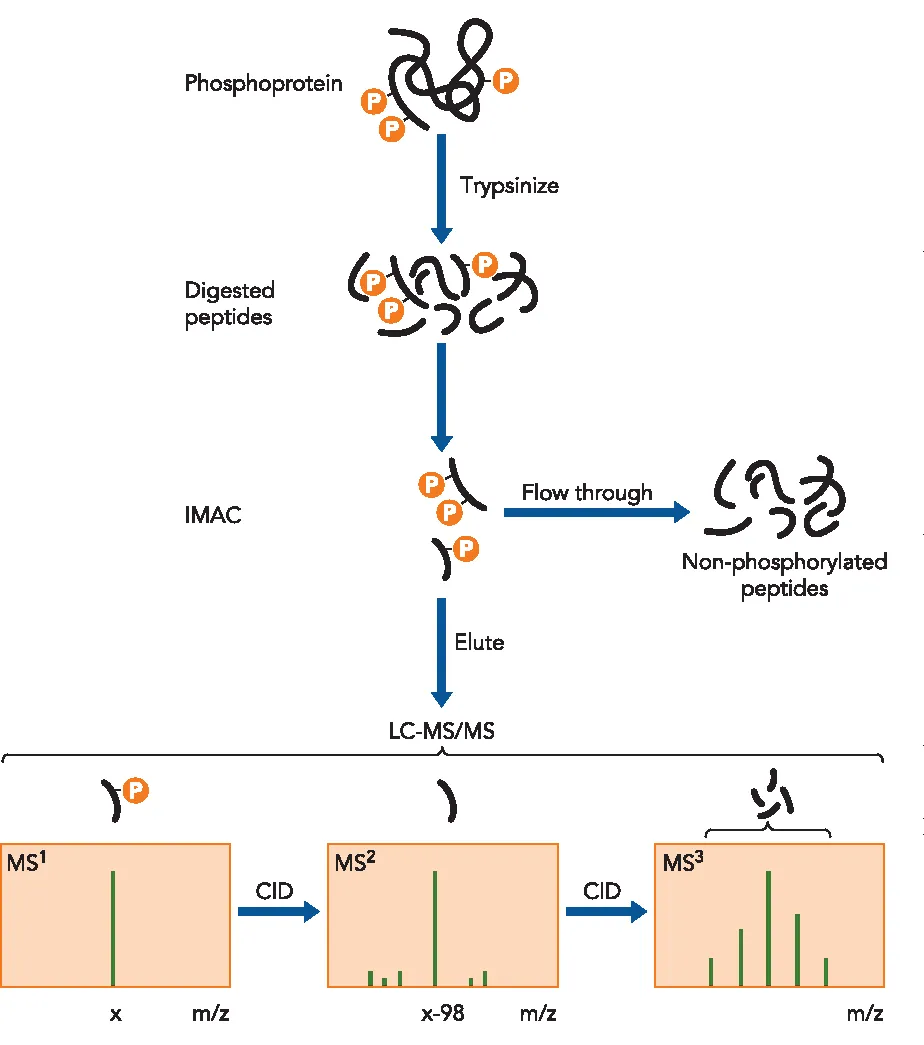Peptide Enrichment Service | MS-compatible
Peptide enrichment focuses on improving sample pretreatment for enhanced sensitivity and specificity in mass spectrometry (MS) detection. By employing selective enrichment strategies to remove interfering substances and concentrate target peptides, this service significantly increases the detection rate of low-abundance proteins and post-translationally modified (PTM) peptides. It is broadly compatible with various mass spectrometry platforms (such as LC-MS/MS), ensuring that peptides in the enriched samples maintain excellent MS compatibility without compromising downstream digestion, separation, or ionization efficiency.
Peptide enrichment service holds substantial application value in proteomics and PTM research, including phosphorylation, acetylation, and glycosylation studies. It is particularly suitable for signaling pathway analysis, disease mechanism research, clinical biomarker discovery, and drug target screening. Through efficient enrichment techniques, this service markedly enhances the depth and precision of MS-based analysis, providing critical support for high-throughput and quantitative protein studies.

Brandi, J. et al. Journal of Chromatography A, 2022.
Figure 1. Summary of the Most Common Affinity Enrichment Strategies for PTMs Analysis.
Services at MtoZ Biolabs
Leveraging high-resolution mass spectrometry platforms and a variety of enrichment techniques, the peptide enrichment service has launched by MtoZ Biolabs , which enables selective enrichment of low-abundance post-translationally modified (PTM) peptides, including phosphorylation, acetylation, and methylation. This service is designed to enhance the sensitivity and specificity of mass spectrometry analysis through efficient peptide enrichment strategies. By employing optimized sample preparation workflows and enrichment methods, it ensures the acquisition of high-quality peptide data to support downstream applications such as proteomics studies, PTM analysis, and biomarker discovery. Common peptide separation and enrichment techniques for post-translational modifications include the following:

1. IMAC (Immobilized Metal Affinity Chromatography)
Utilizes metal ions such as Fe³⁺ to bind phosphate groups, specifically enriching phosphorylated peptides with high specificity.
2. SCX (Strong Cation Exchange Chromatography)
Separates peptides based on differences in positive charge; commonly used for pre-enrichment of phosphopeptides and works optimally in combination with IMAC or TiO₂.
3. MOAC (Metal Oxide Affinity Chromatography)
Employs metal oxides (e.g., titanium dioxide, aluminum oxide) for their affinity to phosphate groups, selectively enriching phosphorylated proteins.
4. HILIC (Hydrophilic Interaction Liquid Chromatography)
Separates peptides based on hydrophilicity; ideal for enriching polar modifications such as glycopeptides and phosphopeptides, and for processing complex biological samples.
5. RP (Reversed-Phase Chromatography)
Separates peptides based on hydrophobicity; commonly used for purification of enriched samples to improve MS resolution and signal-to-noise ratio.
6. IP (Immunoprecipitation)
Uses modification-specific antibodies to enrich targeted modifications (e.g., acetylation, ubiquitination); suitable for precise capture of low-abundance modifications.
7. Lectin Affinity Chromatography
Relies on lectin binding to specific glycan structures; specifically enriches and identifies glycosylated peptides.
Analysis Workflow
1. Protein Sample Preparation
Target proteins are extracted from cells, tissues, or purified protein samples and subjected to denaturation, reduction, and alkylation to ensure efficient enzymatic digestion and preservation of modifications.
2. Proteolytic Digestion
Appropriate proteases are selected based on the target protein to digest the sample, generating peptide mixtures suitable for mass spectrometry analysis.
3. Peptide Separation and Enrichment
Based on the target modification type or physicochemical properties, various enrichment strategies are employed to selectively isolate specific peptides.
4. LC-MS/MS Analysis
The enriched peptides are loaded onto a high-resolution LC-MS/MS platform for high-sensitivity detection, collecting peptide sequence and modification information.

Pisitkun, T. et al. J. Physiol. 2007.
Figure 2. Enrichment Process of Phosphoprotein Peptides.
Sample Submission Suggestions
1. Sample Types
Compatible with various sample sources, including cell lysates, tissue homogenates, serum/plasma, and purified proteins.
2. Buffer Requirements
Avoid using components that may interfere with enzymatic digestion or mass spectrometry detection, such as SDS, EDTA, glycerol, and DTT.
3. Sample Storage and Transportation
Samples should be stored at –80°C to prevent protein degradation or loss of modifications due to freeze-thaw cycles. During transportation, dry ice cold chain is required. For liquid samples, lyophilization or concentration is recommended to enhance stability.
Service Advantages
1. High-Selectivity Enrichment
Utilizes various specific enrichment strategies (such as IMAC, TiO₂, antibody affinity, Lectin, etc.) tailored to different modification types to effectively enhance the enrichment efficiency of target peptides.
2. Support for Multiple PTM Types
Applicable to the separation and enrichment of various post-translationally modified peptides, including phosphorylation, acetylation, glycosylation, and ubiquitination, meeting diverse research needs.
3. High Scalability
Compatible with multiple chromatographic techniques (e.g., SCX, HILIC, reversed-phase chromatography), enabling high-throughput and multidimensional separation strategies suitable for complex samples and large-scale studies.
4. One-Stop Service
Covers sample processing, enrichment strategy selection, MS-compatibility optimization, and downstream analysis interfacing, providing full-process support and simplifying experimental workflows.
FAQ
Q1: Can Enriched Samples Be Recovered for Other Experiments?
A1: The enrichment process ensures high recovery rates. Remaining samples can be used for further validation experiments, such as Western blot or parallel omics analyses.
Q2: Do you Provide Technical Support and Customization for Enrichment Strategies?
A2: Yes. We offer tailored recommendations based on the sample type and research objectives, and we can combine multiple enrichment strategies to simultaneously capture various modifications.
Deliverables
1. Comprehensive Experimental Details
2. Materials, Instruments, and Methods
3. Total Ion Chromatogram & Quality Control Assessment (project-dependent)
4. Data Analysis, Preprocessing, and Estimation (project-dependent)
5. Bioinformatics Analysis
6. Raw Data Files
Related Services
Post-Translational Modifications Proteomics Service
PTM Quantitative Analysis Service
Protein PTM Qualitative Analysis Service
Phosphopeptide Enrichment Followed by Mass Spectrometry (TiO₂/IMAC) Service
How to order?







